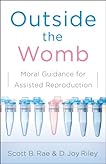 Outside the Womb
Outside the Womb by Scott Rae
My rating: 1 of 5 stars
Outside the Womb / 978-0-802-45042-5
My husband and I are currently going through IVF, so a title like "Outside the Womb: Moral Guidance for Assisted Reproduction" definitely caught my attention. As it turns out, I couldn't be a worse audience for this book. First of all, the title of this book *really* should be "Outside the Womb: Protestant Christian Guidance for Assisted Reproduction" because the only ethical source used here is the Protestant Christian Bible. I have no problem with literature designed to cater to a specific demographic, but books should be *labeled* as such and "moral guidance" implies to me a much broader range than just Christian doctrine.
Literally nothing is consulted in this book except carefully excised passages from the Bible, and the authorial interpretation of those passages. There's no mention of the science or technology behind infertility or assisted reproduction; in fact, the book claims that "infertility - as well as all illnesses or difficulties - is a result of the entrance of sin into the world". The author is a Biblical literalists who believes that Adam and Eve existed and that the "first family" should be modeled in all reproductive choices. He insists that "third party participation" in reproduction (i.e., surrogacy, donated eggs, donated sperm, donated embryos) is not God's plan for people's lives. (The concubines that the Biblical patriarchs had are excused here as being "property". I'm not sure what we're supposed to take from this - "Don't use donated eggs, but buying them is peachy"? I really don't know.)
The "ethical situations" this book proposes to address are strawman cases that will not apply to 99.9% of people. In the case of the "moral repercussions" of donated sperm, the book seriously poses the question "Is this adultery?" (And is that really a concern in the modern Christian community? Because when I was a kid, if private parts didn't touch, you were good as far as God was concerned.) There's also the "what if two lesbians have an IVF child and then they break up five years later?" panic button, and it's particularly insulting that there's no corresponding "what if a man and a woman have an IVF child and they break up five years later?" question in ethics. I guess it's only a moral issue if lesbians are involved? (By the way, the author insists that two-person, heterosexual marriage is the only marriage that counts as far as God is concerned, so if you happen to not fit in that bucket, this book *definitely* isn't for you.)
So obviously I was the wrong audience for this book, but if you're a young, heterosexual, Protestant Christian in need of assisted reproduction, then this book should be very interesting, right? Unfortunately, no; the authors just serve up a bunch of lukewarm theology about how frozen embryos should never be left in storage because it's moral to try to carry them all to term, with the implication that if your embryos are disposed of, you're probably a murderer. Since most people can't afford to go back for multiple sessions (it's not uncommon for IVF to cost 10 grand or more), this means that most patients who take this advice will try to convince their physicians to shove all the embryos in on a single try, which is dangerous for both the woman AND the embryos. This "theology" has little relation to what's actually in the Bible and ultimately boils down to "because I said so" on the part of the author. The whole book feels like a cheap cash-in at best and a screed on the "evils" of family planning at worse, especially when it starts asking if older women should be legally barred from using their embryos.
I actually consider this book to be massively harmful for anyone struggling with infertility. Infertility is very emotionally and physically trying, and I think it's reprehensible to make someone feel guilty for considering using donated eggs or donated sperm because God doesn't want "third party" DNA in your family; or for couples to suddenly feel pressured to become the next OctoMom because the authors have decided that donating unused embryos to infertile couples or leaving the unused embryos in frozen storage is somehow immoral because 'the Bible says so', even though it doesn't. Maybe some theologians may find this book interesting and worthy of debate, but if you're looking at this because you're personally going through assisted reproduction, I would recommend giving this book a complete pass.
NOTE: This review is based on a free Advance Review Copy of this book provided through NetGalley.
~ Ana Mardoll
View all my reviews



0 comments:
Post a Comment